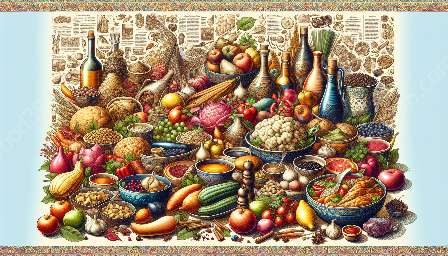Food has always played a central role in the rituals and traditions of ancient civilizations, including in burial ceremonies. The significance of food in ancient burial rituals provides valuable insights into the cultural, social, and spiritual aspects of the societies of the past.
Ancient Food Traditions and Rituals
Ancient food traditions and rituals were deeply intertwined with religious beliefs, social structures, and cultural practices. Food was not only a source of sustenance but also held symbolic and spiritual significance in ancient societies. In many cultures, the preparation, consumption, and offering of food were integral parts of religious ceremonies, including burial rituals. Food offerings were believed to nourish and sustain the deceased in their afterlife journey, emphasizing the continuity of life beyond death.
Furthermore, specific types of food and the manner of their preparation were often associated with particular rituals or events. For example, in ancient Egypt, the inclusion of bread, beer, and other food items in burial chambers signified the provision for the deceased's sustenance in the afterlife. Similarly, in Chinese burial practices, offerings of food, known as 'spirit meals,' were made to the departed to ensure their well-being in the afterlife.
These ancient food traditions and rituals reflect the complex relationship between food, spirituality, and cultural beliefs, highlighting the value placed on nourishment not only in the physical realm but also in the realm of the divine and supernatural.
Origin and Evolution of Food Culture
The role of food in ancient burial rituals provides valuable insights into the origin and evolution of food culture. Burial practices often mirror the prevailing food culture, offering a glimpse into the dietary habits, culinary traditions, and agricultural practices of ancient civilizations.
By studying the food remains and culinary artifacts found in burial sites, archaeologists and historians can reconstruct the dietary patterns and food production techniques of bygone eras. For instance, the presence of specific food items, such as grains, fruits, or animal products, in burial offerings can shed light on the agricultural practices and dietary preferences of ancient societies.
Moreover, the evolution of food culture can be traced through changes in burial rituals over time. Shifts in burial practices, including alterations in food offerings, the use of specific cooking vessels, or the inclusion of culinary tools, provide evidence of cultural transformations and the adaptation of food-related customs to changing social and religious dynamics.
Cultural, Social, and Spiritual Significance
The significance of food in ancient burial rituals extends beyond mere sustenance. Food offerings in burial ceremonies were laden with cultural, social, and spiritual meanings, reflecting the interconnectedness of food with the fabric of ancient societies.
From a cultural perspective, the types of food included in burial offerings often reflected the culinary traditions and food symbolism prevalent in the society. Certain food items may have held specific cultural significance, such as symbolizing prosperity, fertility, or life beyond death, thereby embodying the cultural ethos of the community.
Socially, the preparation and sharing of food in burial rituals served as a unifying force, bringing together family members, community members, and religious leaders in commemoration of the departed. The act of communal dining and collective remembrance fostered a sense of togetherness and solidarity, reaffirming the social bonds within the community.
From a spiritual perspective, the provision of food for the deceased was rooted in the belief in an afterlife or the continuation of the soul beyond death. The offerings of food were imbued with the belief in sustaining the departed in their spiritual journey, underscoring the intimate connection between food, life, and the divine in the ancient worldview.
Overall, the role of food in ancient burial rituals offers a multidimensional lens through which to understand the ancient food traditions, rituals, and the evolution of food culture. It unveils the intricate tapestry of beliefs, values, and practices surrounding food in the ancient world, providing valuable insights into the cultural, social, and spiritual dynamics of bygone civilizations.


